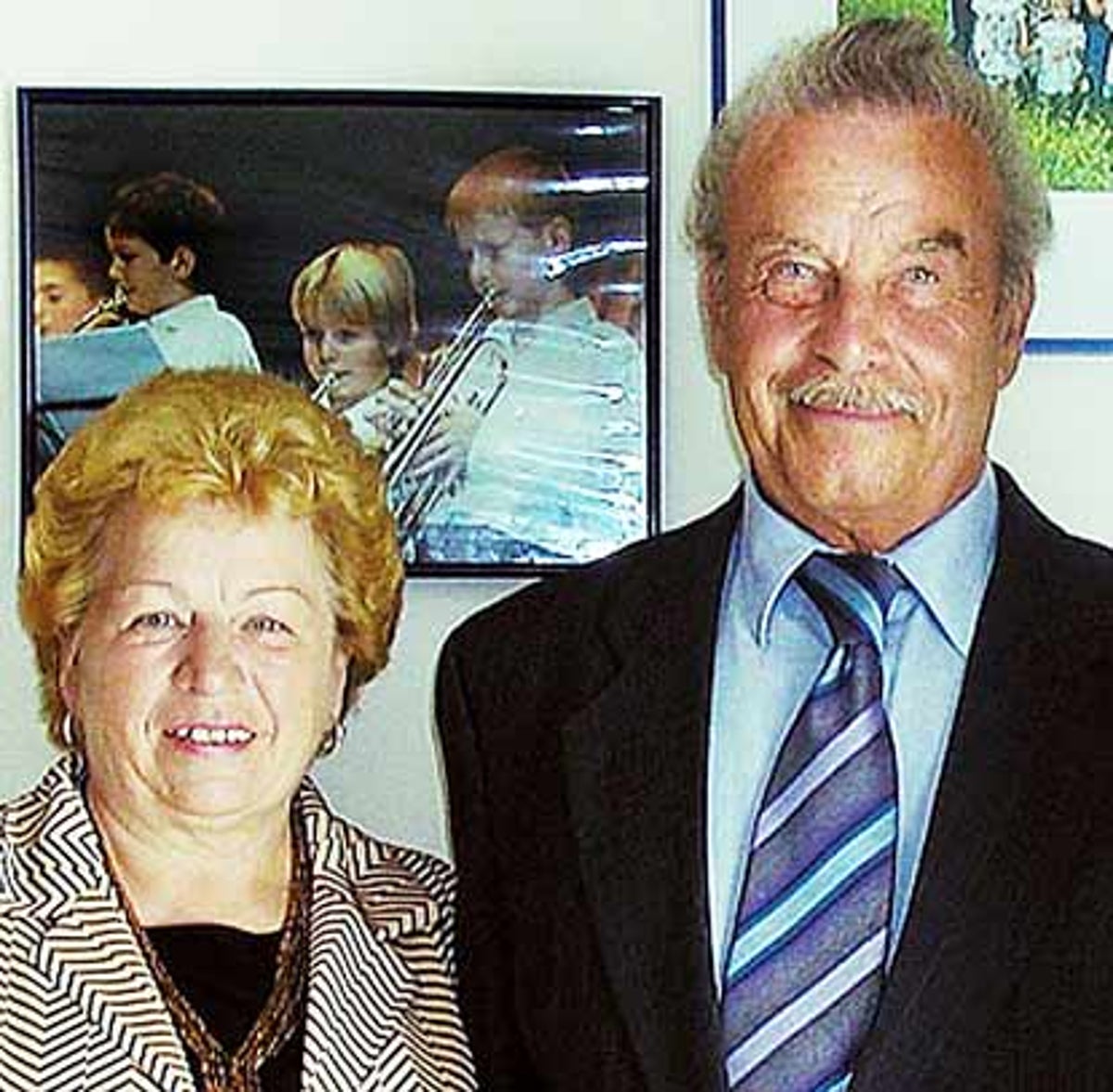Born into a world that would later become the epicenter of one of Austria’s most harrowing cases, Rosemarie’s story has captured global attention. Her life has been a rollercoaster of emotions, challenges, and moments of quiet strength. While many know her name in connection to a dark chapter in history, her personal journey extends far beyond the headlines. Rosemarie Fritzl’s story is not just about survival—it’s about rebuilding, healing, and finding light in the darkest of places. Her early years were marked by a seemingly ordinary upbringing in a small Austrian town. However, beneath the surface, her family life was anything but normal. As the wife of Josef Fritzl, Rosemarie became an unwitting participant in a deeply disturbing saga that shocked the world. Despite the unimaginable circumstances, Rosemarie’s life has been defined by her quiet determination to move forward. Her story serves as a reminder of the strength of the human spirit and the power of hope even in the face of overwhelming despair. In this article, we will delve into the life of Rosemarie Fritzl, exploring her biography, personal details, and the legacy she has built in the aftermath of tragedy. From her early years to her role in one of the most infamous cases in modern history, we will uncover the nuances of her journey. Additionally, we will address key questions about her life, her resilience, and the lessons we can learn from her experiences. By the end of this article, you will have a comprehensive understanding of Rosemarie Fritzl’s life and the enduring impact she has had on those who hear her story.
Table of Contents
- Biography of Rosemarie Fritzl
- Personal Details and Bio Data
- What Was Rosemarie Fritzl’s Life Like Before the Tragedy?
- What Role Did Rosemarie Fritzl Play in the Infamous Case?
- How Did Rosemarie Fritzl Rebuild Her Life After the Tragedy?
- What Is the Legacy of Rosemarie Fritzl?
- Lessons We Can Learn from Rosemarie Fritzl’s Story
- Frequently Asked Questions About Rosemarie Fritzl
Biography of Rosemarie Fritzl
Rosemarie Fritzl was born on June 15, 1954, in Amstetten, a small town in Lower Austria. Her early years were marked by a relatively ordinary upbringing, though her family dynamics were far from conventional. Growing up in a modest household, Rosemarie was known for her quiet demeanor and strong sense of responsibility. She married Josef Fritzl in 1967, at the age of 23, and together they had seven children. However, her life took a dark and unimaginable turn as she became entangled in one of the most shocking cases of abuse and captivity in modern history. The infamous case involving her husband, Josef Fritzl, came to light in 2008, when it was revealed that he had held his daughter Elisabeth captive in a basement for 24 years. During this time, Elisabeth bore seven children, fathered by Josef himself. Rosemarie, unaware of the full extent of the horrors taking place beneath her home, became an unwitting participant in the tragedy. Her role in the case has been the subject of much debate, with many questioning how much she truly knew and whether she could have intervened. Despite the overwhelming scrutiny and public judgment, Rosemarie Fritzl’s life after the case has been marked by a quiet determination to rebuild and heal. She has largely stayed out of the public eye, focusing on her family and personal recovery. Her story is one of resilience, as she has worked tirelessly to move forward and create a semblance of normalcy in the aftermath of unimaginable trauma. Rosemarie’s biography is a testament to the strength of the human spirit and the ability to find hope even in the darkest of circumstances.
Personal Details and Bio Data
| Full Name | Rosemarie Fritzl |
|---|---|
| Date of Birth | June 15, 1954 |
| Place of Birth | Amstetten, Lower Austria |
| Spouse | Josef Fritzl (married 1967) |
| Children | 7 (with Josef Fritzl) |
| Notable Event | 2008 Amstetten case involving Josef Fritzl |
| Current Status | Living a private life in Austria |
What Was Rosemarie Fritzl’s Life Like Before the Tragedy?
Before the world learned of the harrowing events that unfolded in her home, Rosemarie Fritzl led what appeared to be an ordinary life in the quaint town of Amstetten, Austria. Born in 1954, she grew up in a modest household, where she was known for her quiet and reserved nature. Her early years were marked by a sense of normalcy, though her family dynamics were far from typical. Rosemarie married Josef Fritzl at the age of 23, and together they raised seven children, creating what seemed to be a picture-perfect family from the outside. However, beneath the surface, cracks began to form in Rosemarie’s seemingly idyllic life. Her husband, Josef, was a domineering and controlling figure who exerted significant influence over the household. Rosemarie’s role as a wife and mother was defined by her commitment to her family, but it also left her isolated from the outside world. She rarely ventured beyond the confines of her home, and her social interactions were limited to family and close acquaintances. This isolation, coupled with Josef’s authoritarian behavior, created an environment where Rosemarie’s autonomy was severely restricted. Despite the challenges she faced, Rosemarie was known for her resilience and dedication to her children. She worked tirelessly to provide for her family, often going above and beyond to ensure their well-being. However, her lack of awareness about the true nature of Josef’s actions left her blindsided when the truth came to light. Rosemarie’s life before the tragedy was a complex tapestry of love, duty, and quiet suffering—a stark contrast to the unimaginable events that would later define her legacy.
Read also:Unveiling The World Of Amyyyy007 A Deep Dive Into Creativity And Expertise
Key Aspects of Her Early Life
- **Family Dynamics:** Rosemarie’s relationship with Josef was marked by his controlling behavior and her submissive role within the household. - **Isolation:** She lived a largely secluded life, with limited social interactions outside her immediate family. - **Commitment to Family:** Despite the challenges, Rosemarie remained deeply committed to her children, prioritizing their well-being above all else.
What Role Did Rosemarie Fritzl Play in the Infamous Case?
When the shocking details of the Amstetten case emerged in 2008, Rosemarie Fritzl found herself at the center of a media firestorm. The world was left grappling with the question: How much did she know about the horrors taking place beneath her own home? Rosemarie’s role in the case has been a subject of intense scrutiny and debate. While some have accused her of complicity or willful ignorance, others believe she was as much a victim of Josef Fritzl’s manipulation as anyone else. According to official reports, Rosemarie claimed to have been unaware of the full extent of Josef’s actions. She stated that she believed her daughter Elisabeth had left home voluntarily and that the children born in captivity were allegedly the result of Elisabeth’s relationship with an unknown man. However, these claims have been met with skepticism, as many find it difficult to believe that Rosemarie could have remained oblivious to the truth for so long. The basement where Elisabeth was held captive was located directly beneath the family home, and the logistics of the situation raise questions about Rosemarie’s level of involvement or awareness. Despite the public judgment, it is important to consider the psychological and emotional dynamics at play. Rosemarie’s life was defined by Josef’s control, and it is possible that she was manipulated into accepting his version of events. Her isolation from the outside world and dependence on Josef may have left her ill-equipped to challenge his narrative. While the truth may never be fully known, Rosemarie’s role in the case remains a complex and deeply troubling aspect of this harrowing story.
Factors Influencing Her Role
- **Psychological Manipulation:** Josef’s domineering behavior likely played a significant role in shaping Rosemarie’s perception of reality. - **Isolation:** Her limited contact with the outside world may have hindered her ability to question Josef’s actions. - **Public Perception:** The media’s portrayal of Rosemarie has often overshadowed the nuances of her situation, leading to a one-dimensional narrative.
How Did Rosemarie Fritzl Rebuild Her Life After the Tragedy?
In the aftermath of the Amstetten case, Rosemarie Fritzl faced an uphill battle to rebuild her life. The public scrutiny, personal trauma, and loss of trust in those closest to her created a perfect storm of challenges. Yet, Rosemarie demonstrated remarkable resilience as she navigated the complexities of healing and moving forward. Her journey toward recovery has been marked by a quiet determination to reclaim her sense of self and create a semblance of normalcy in a world that had been irrevocably altered. One of the first steps Rosemarie took was distancing herself from the public eye. She chose to live a private life, focusing on her immediate family and personal well-being. This decision allowed her to escape the relentless media attention and begin the process of healing in a safe and supportive environment. Rosemarie also sought professional help, working with therapists and counselors to address the emotional scars left by the trauma. These sessions provided her with the tools to process her experiences and rebuild her sense of identity. In addition to therapy, Rosemarie found solace in reconnecting with her children and grandchildren. Her relationships with her family became a source of strength and motivation, helping her to focus on the positive aspects of her life. She also embraced small, everyday joys, such as gardening and spending time in nature, which served as a form of therapy in themselves. Rosemarie’s ability to find light in the darkest of places is a testament to her unwavering resilience and courage.
Steps Toward Healing
1. **Embracing Privacy:** Rosemarie chose to live a secluded life, shielding herself from public scrutiny. 2. **Seeking Professional Help:** Therapy played a crucial role in her emotional recovery. 3. **Reconnecting with Family:** Her relationships with her children and grandchildren provided a strong support system. 4. **Finding Joy in Simplicity:** Activities like gardening helped her rediscover happiness in everyday life.
What Is the Legacy of Rosemarie Fritzl?
Rosemarie Fritzl’s legacy is a complex and multifaceted one, shaped by the harrowing events of her life and her subsequent journey toward healing. While her name is often associated with the Amstetten case, her story extends far beyond the tragedy. Rosemarie’s resilience in the face of unimaginable adversity has inspired countless individuals, serving as a powerful reminder of the strength of the human spirit. Her ability to rebuild her life and find peace in the aftermath of trauma has left an indelible mark on those who hear her story. One of the most significant aspects of Rosemarie’s legacy is her role as a symbol of resilience and hope. Despite the public judgment and personal challenges she faced, she chose to focus on healing and moving forward. Her quiet determination to reclaim her life has resonated with many, offering a beacon of hope for those navigating their own struggles. Rosemarie’s story underscores the importance of compassion and understanding, encouraging society to look beyond surface-level judgments and recognize the complexities of human experiences. In addition to her personal impact, Rosemarie’s story has contributed to broader discussions about domestic abuse, isolation, and the psychological effects of trauma. Her experiences have shed light on the ways in which manipulation and control can shape a person’s reality, prompting important conversations about the need for support systems and resources for victims of abuse. By sharing her journey, Rosemarie has helped to raise awareness and inspire change, ensuring that her legacy extends beyond her personal story.
Read also:Discovering Diana Rider The Ultimate Guide To Her Life Achievements And Influence
Key Contributions to Her Legacy
- **Symbol of Resilience:** Rosemarie’s ability to overcome trauma has made her a source of inspiration for many. - **Advocacy for Awareness:** Her story has sparked important discussions about domestic abuse and psychological manipulation


